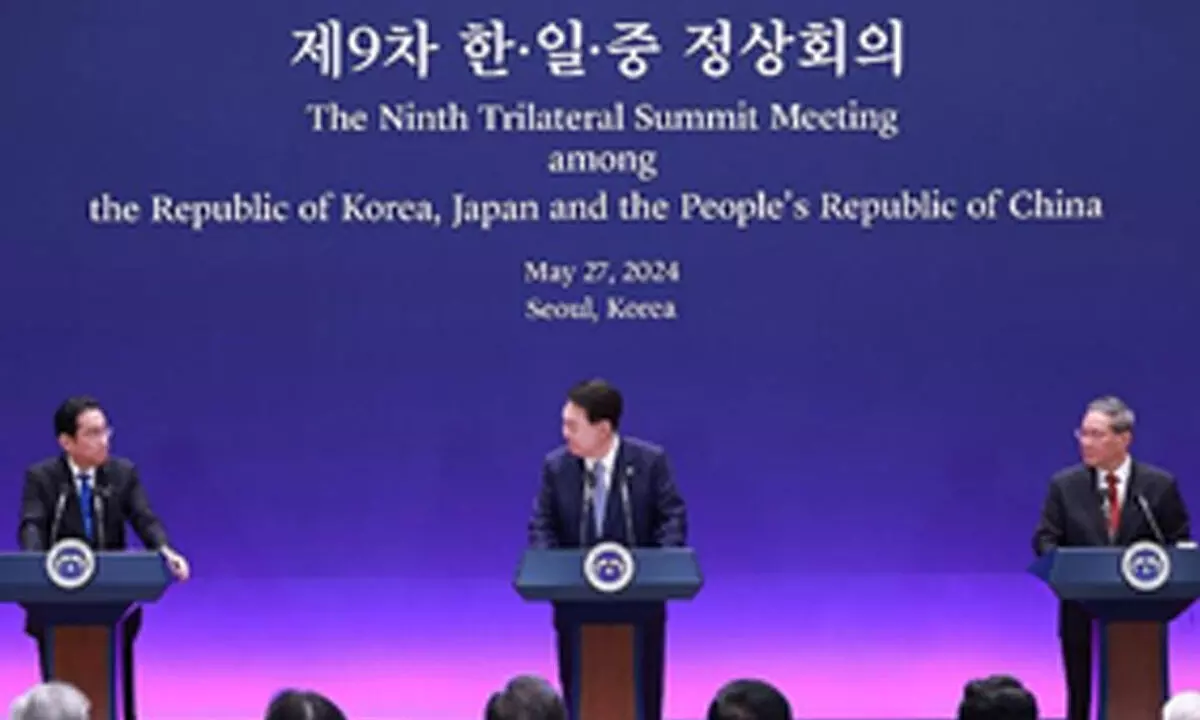Live
- India Faces Blow as Pacer Mohammed Shami Ruled Out for Remainder of Australia Series
- Farmer’s Day Celebrations Held at Palem Agricultural Research Center, Nagarkurnool
- Biden Pardon: Joe Biden Commutes Death Sentences of 37 Inmates, Including Child Killers and Mass Murderers
- South Korea: Yoon believes impeachment trial takes priority over martial law probe
- Strict Action for Non-Adherence to Time Management - DMHO Dr. Swarajya Lakshmi
- Joyful Semi-Christmas Celebrations at Sri Saraswathi International School
- Over 13.29 lakh houses approved for rural poor in Maharashtra: Shivraj Chouhan
- District Collector Urges Timely Completion of Indiramma Housing Scheme Survey
- Digital Arrest Scam: Hyderabad Man Duped of ₹7 Lakhs by Fake Crime Branch Police Callers
- Sukhbir Badal seeks President's Police medal for officer who saved his life
Just In
South Korea, Japan, China reaffirm commitment to Korean Peninsula peace amid North Korea satellite plan

Leaders of South Korea, Japan, and China reaffirmed their commitment to promote peace and stability on the Korean Peninsula during their summit in Seoul on Monday, hours after North Korea announced a satellite launch plan.
Seoul: Leaders of South Korea, Japan, and China reaffirmed their commitment to promote peace and stability on the Korean Peninsula during their summit in Seoul on Monday, hours after North Korea announced a satellite launch plan.
President Yoon Suk Yeol, Japanese Prime Minister Fumio Kishida, and Chinese Premier Li Qiang reached the agreement after North Korea notified Japan of its plan to launch a space rocket carrying a military spy satellite sometime before June 4, Yonhap news agency reported.
"We reaffirmed that maintaining peace, stability, and prosperity on the Korean Peninsula and in Northeast Asia serves our common interest and is our common responsibility," a joint declaration of the trilateral summit said.
"We reiterated positions on regional peace and stability, denuclearisation of the Korean Peninsula, and the abduction issue, respectively. We agree to continue to make positive efforts for the political settlement of the Korean Peninsula issue," it added.
During a joint press conference, Yoon and Kishida emphasised the importance of denuclearisation on the Korean Peninsula.
However, Li did not address denuclearisation directly, instead urging relevant parties to exercise restraint to prevent further escalation.
This contrasts with the 2019 trilateral summit, where China also expressed support for efforts toward denuclearisation of the Korean Peninsula.
During the session, Yoon and Kishida denounced North Korea's satellite launch plan as a violation of the UN Security Council resolutions that ban its use of ballistic missile technology.
Pyongyang said it will send three more satellites into space this year, following its first launch in November.
"The international community must respond firmly," Yoon said during a joint press briefing at the former President Cheong Wa Dae.
Kishida echoed his concerns, urging Pyongyang to cease its activities.
"If it proceeds, it will be a violation of UN Security Council resolutions. We strongly urge North Korea to cease this activity," Kishida said.
China's Li called on all related countries to exercise restraint without a direct mention of North Korea.
"China has consistently worked to promote peace and stability on the Korean Peninsula and is pushing for a political resolution to the peninsula issue. Relevant parties should exercise restraint and prevent the situation from worsening and becoming more complicated," Li said during the briefing.
Li, China's No. 2 official, also called for joint efforts to foster cooperation through "mutual respect and trust".
"Korea, Japan, and China should properly handle sensitive issues and conflicts, consider each other's core interests and significant concerns, and practice genuine multilateralism to jointly safeguard stability in the Northeast Asian region," Li said.
The trilateral session discussed ways to promote cooperation in six specific areas -- economy and trade, sustainable development, health issues, science and technology, disaster and safety management, and people-to-people exchanges.
The leaders also agreed to institutionalise the trilateral cooperation by holding the trilateral summit and ministerial meetings regularly.
Monday's session was the first three-way meeting since December 2019 after it was suspended for a prolonged period due to Covid-19 and historical disputes among the Asian neighbours.
After the meeting, they attended a trilateral business summit at the Korea Chamber of Commerce and Industry, engaging with business leaders of the three nations.
During the summit, the leaders pledged to work together to promote cooperation in trade and investment, as well as supply chain resilience and export controls.
"We will continue to work to ensure a global level playing field to foster a free, open, fair, non-discriminatory, transparent, inclusive, and predictable trade and investment environment," the joint declaration said.
They agreed to resume talks on a three-way free trade agreement (FTA), which was suspended in November 2019 following 16 rounds of official negotiations after they began in 2012.
The leaders committed to ensure the "transparent, smooth and effective" implementation of the Regional Comprehensive Economic Partnership.
It is an FTA among 15 Asia-Pacific countries, involving the three nations.
China is the largest trading partner of South Korea and Japan, and together, they make up about 25 per cent of the global gross domestic product and 20 per cent of global trade.
Despite differing alignments and stances on various issues, the three nations agreed to coordinate on regional and international matters from a broader perspective.
"As important countries responsible for peace, stability, and prosperity in Asia, we renew our determination to engage in close communication not only within the trilateral framework but also in the multilateral frameworks," it said.
This year marks a rare instance of all three Northeast Asian neighbours serving together on the UN Security Council, with China as a permanent member and South Korea and Japan as non-permanent members.

© 2024 Hyderabad Media House Limited/The Hans India. All rights reserved. Powered by hocalwire.com






